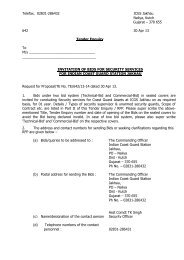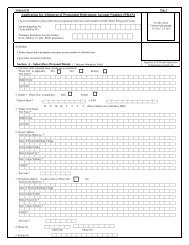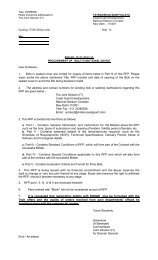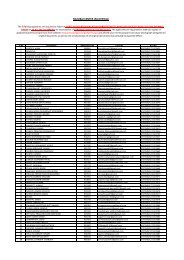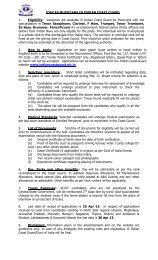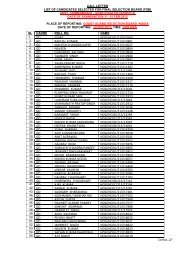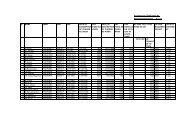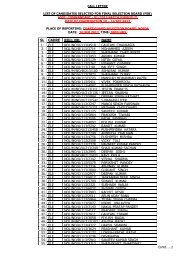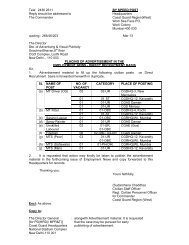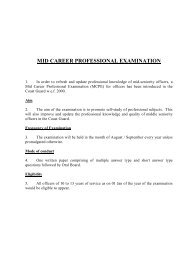eastern region oil spill disaster contingency plan - Indian Coast Guard
eastern region oil spill disaster contingency plan - Indian Coast Guard
eastern region oil spill disaster contingency plan - Indian Coast Guard
Create successful ePaper yourself
Turn your PDF publications into a flip-book with our unique Google optimized e-Paper software.
- 21 -<br />
may be required by RCC /OSC when such <strong>oil</strong> <strong>spill</strong> will spread beyond 500<br />
mtrs.<br />
(d) Providing data on crude <strong>oil</strong> and <strong>oil</strong> discharges.<br />
(e) Providing data on subsea pipelines which may required by RCC /OSC<br />
(f) Providing <strong>oil</strong> transshipment facilities in case of ONGC or any agency<br />
under its control being the polluter.<br />
(g) Provide staging facilitates for helicopters in the offshore areas when<br />
engaged in pollution response in the vicinity whether or not ONCG and<br />
agencies under its control are the polluters.<br />
1.39. Receiver of Wrecks.<br />
(a) To assist Local Action “Group in whatever manner necessary and<br />
possible.<br />
(b) To take all actions necessary under part XIII of the Merchant<br />
Shipping Act 1958 (in this connection the Receiver of Wreck shall consult<br />
the DGS, as and when required).<br />
(c) In situations where he has the local responsibility for certain actions<br />
and /or operations, he may authorize other agencies, which are better<br />
equipped.<br />
1.40. Only Regional public Relation Officer or the officer nominated by RCA will<br />
interact with media on issues pertaining to pollution response. During interaction<br />
with the media following information may be provided.<br />
(a) Cause of the incident and action taken<br />
(b) Damages and <strong>spill</strong> response status, areas threatened<br />
(c) Environmental damages and action taken<br />
(d) Cleanup activities<br />
Training and Exercise<br />
1.41. When <strong>oil</strong> <strong>spill</strong> incident occurs, decisions have to be made quickly and<br />
equipment must be ready for deployment at very short notice. The only reliable<br />
way for this to be achieved is to develop local <strong>contingency</strong> <strong>plan</strong>s, conduct<br />
exercises to validate, maintain pollution response equipment and train personnel<br />
in its use. The adequacy of such preparations should be tested thoroughly in full<br />
scale desktop and practical exercises and the lessons learnt from actual marine<br />
<strong>oil</strong> <strong>spill</strong>s should be fed back to improve the <strong>contingency</strong> <strong>plan</strong> and the exercise<br />
programme. Towards this effort, an <strong>oil</strong> <strong>spill</strong> response exercise guidelines<br />
(OSREG) have been formulated by CGHQ.




